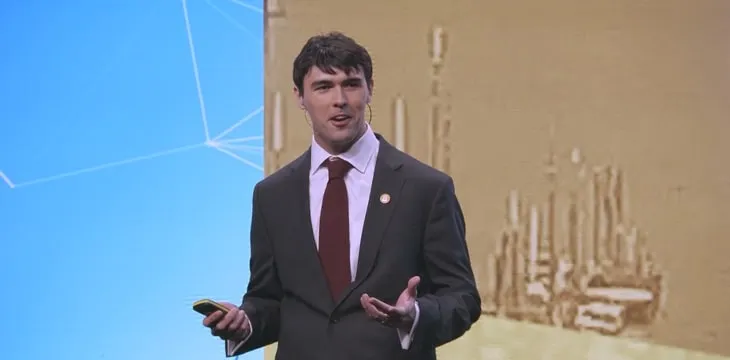|
Getting your Trinity Audio player ready...
|
True Reviews, the service that aims to lift the quality of online consumer reviews with Bitcoin micropayments, got a boost this week with investor Calvin Ayre backing the company. The new investment, for an undisclosed amount, came as a result of True Reviews’ presentation at the Bitcoin Association BSV Venture Pitch Day last October in Seoul.
Speaking to CoinGeek, co-founder and CEO Connor Murray said True Reviews plans to hire a team of experienced developers to help build and expand the project. That includes its new product “Veritas”, which allows more definite proof that a reviewer has actually purchased the product or service they’re reviewing.
Letting consumers publish detailed reviews of everything from books and clothes to hotels and haircuts has been a great way to hear real-life experiences and help people make better choices. One major issue though has been uncertainty over how genuine many of those experiences actually were. Did a restaurant pay friends to write positive reviews? Did that negative review come from someone who really had a bad meal, or did it come from a competitor trying to damage a rival business? There’s really no way of knowing for sure.
As Murray says, there’s another problem in that reviewers don’t own the content they post. This is a common problem for many user content-driven platforms, and it’s a problem Bitcoin can solve easily. True Reviews doesn’t have ads on its site, but earns its income from small commissions on each transaction made there.
Posting a review will cost you about 2 cents (so will interactions such as likes and comments). That’s not much to pay, and doesn’t guarantee 100% against trolls and fakes—but it adds “skin in the game,” and since it’s Bitcoin SV (BSV), usually connects the reviewer to a more traceable real-world identity. It’s an added incentive to be honest, and not attempt to “game the system.”
If someone interacts with your content you’ll get a cut too, similar to other BSV social networks like Twetch.
Veritas will tokenize the proof of purchase to link it to the reviewer, further guaranteeing a genuine purchase and opinion. CoinGeek chatted with Connor Murray about his plans for the future, and how the current economic situation is affecting his business and the wider industry.
Interview with Connor Murray, CEO and co-founder, True Reviews
What’s your experience been with True Reviews so far? Is it working as expected?
CM: It has been positive and a joy to build alongside my brother. What we are ultimately trying to do with True Reviews is solve two inherent problems with online reviews: 1) Users don’t own their data and thus can’t monetize their valuable information, and 2) There’s no way to validate that reviews are actually tied to a valid proof of purchase. With the launch of our new product Veritas, we can solve problem (2). We now tokenize the proof of purchase and sign the data with a valid paymail signature, and then link that to a review.
Veritas allows us to create verified reviews for any industry and ecosystem. We also need to solve the problem of true data ownership. As of now, users don’t own the plain text data that they are putting on the blockchain. We are building a novel solution with the Run on Bitcoin platform that will enable users to truly own (and therefore monetize) their data.
Are you satisfied with the usage levels? Taking into account current economic/social restrictions, of course.
CM: Obviously with the current state of the world brick-and-mortar businesses are going to see less consumers until we are back to “normal.” With Veritas we can move past brick and mortar stores and enable verified reviews for digital businesses and products. We are building platforms that other businesses can plug into their backend to enable the two use cases I outlined above.
It’s not easy to upend TripAdvisor, and it’s not necessarily useful to consumers to introduce a new platform. Instead we can build a platform that existing systems can integrate into and provide value to existing customers. This allows the possibility of rapidly scaling the use of BSV without needing to onboard users. I don’t think I’ll be satisfied with usage until billions of people are contributing to transactions made via our platforms on the blockchain.
Any unexpected turns or incentives you’ve encountered that required tweaking?
CM: I think the biggest hurdle is how do you build something useful without having to force users to become familiar with BSV or care about it at all. Inevitably we will want every person in the world to have a Bitcoin wallet, and then there is a lot of innovative things we can do with that, but in the meantime we need to get creative to utilize the Bitcoin ledger without forcing users and businesses to care about Bitcoin.
Congratulations on the investment. What are your plans for it?
CM: We are planning to hire experienced developers to continue to build out our platforms. If you are interested in building with us, get in touch!
What important piece of advice would you give to other aspiring BSV startups?
CM: The best advice I’ve been given is to solve a problem that needs to be solved and don’t get distracted from that solution. It’s not good enough to just add Bitcoin to an existing solution—you need to think about how Bitcoin provides a new solution to the problem. Then build it!

 07-04-2025
07-04-2025 





